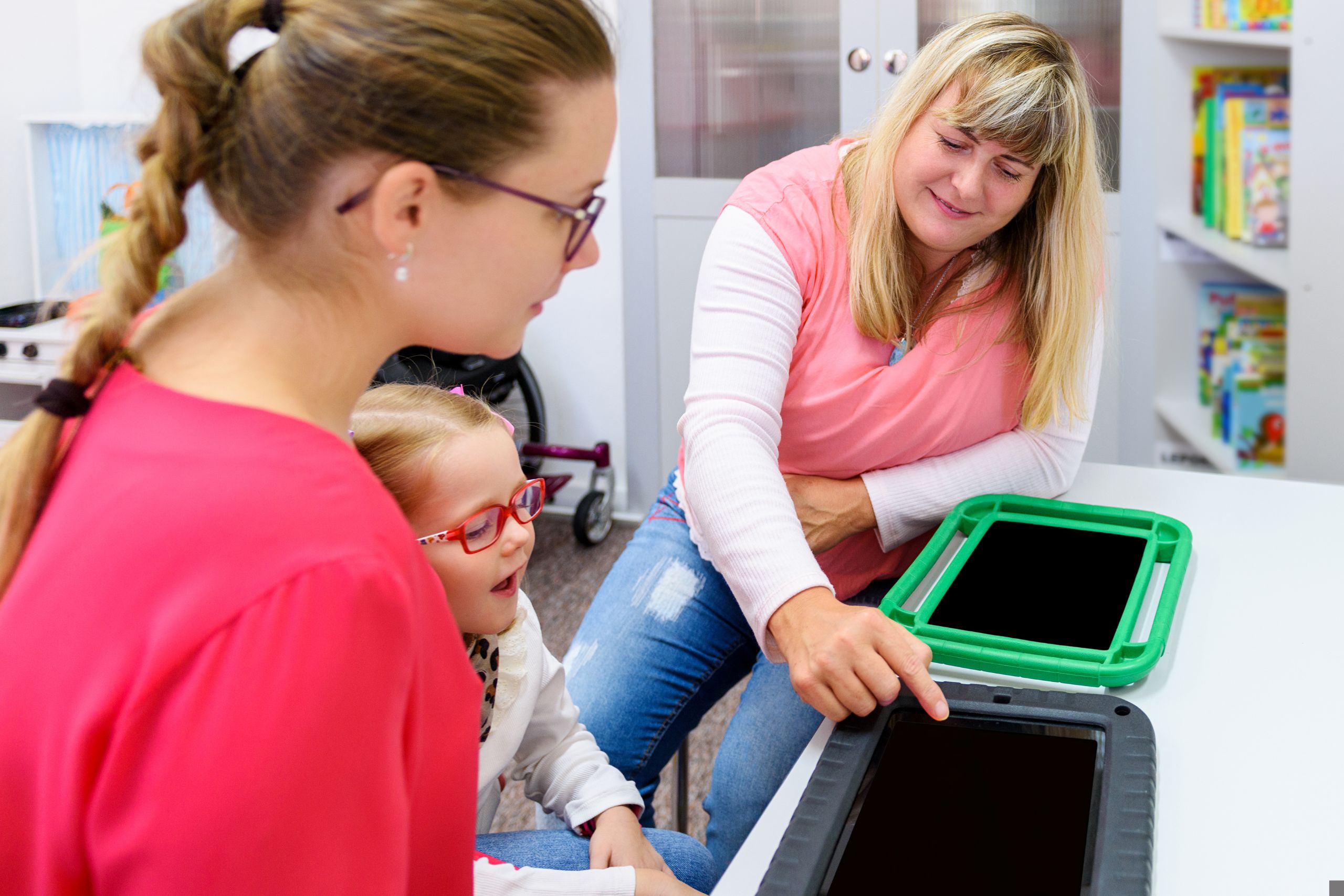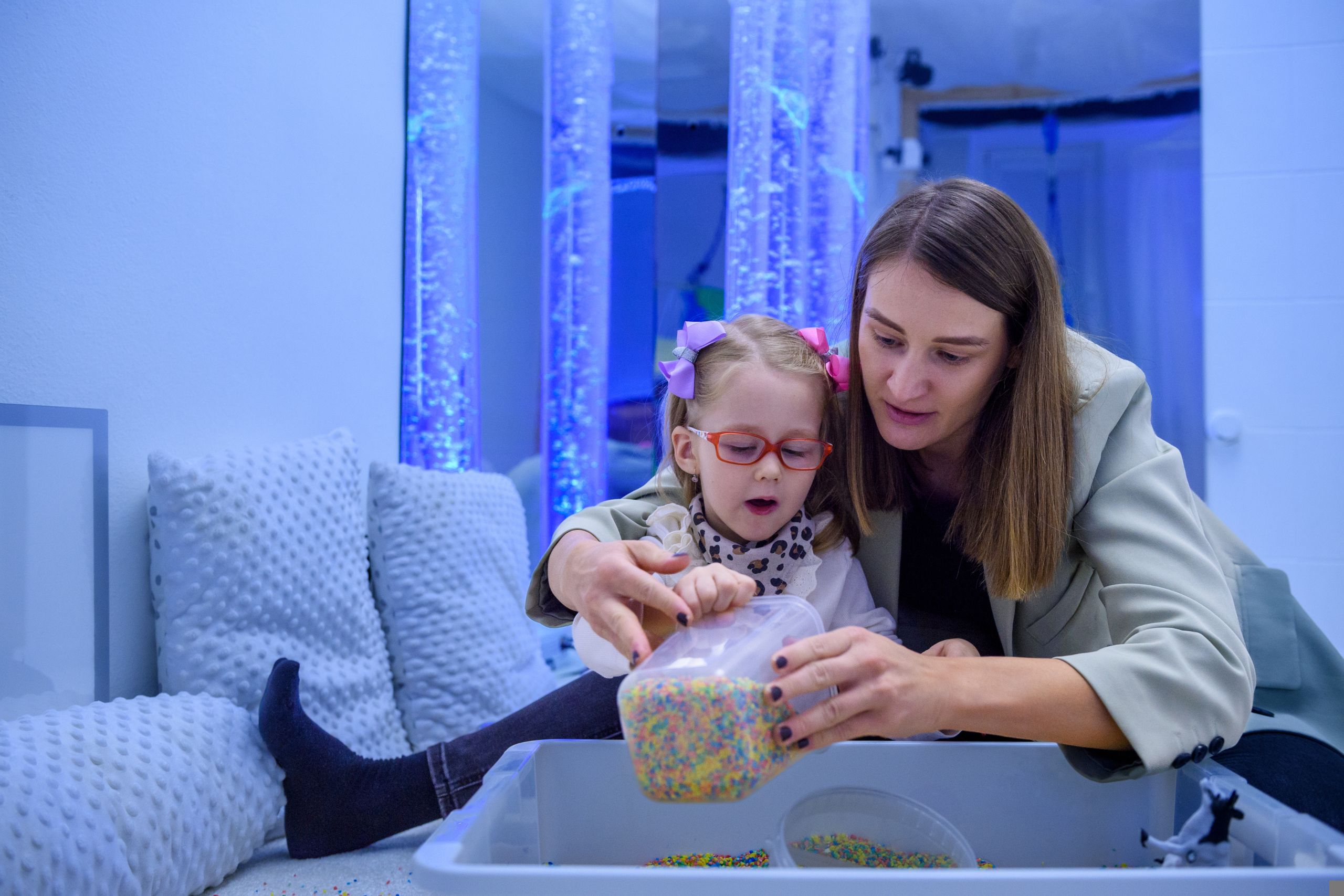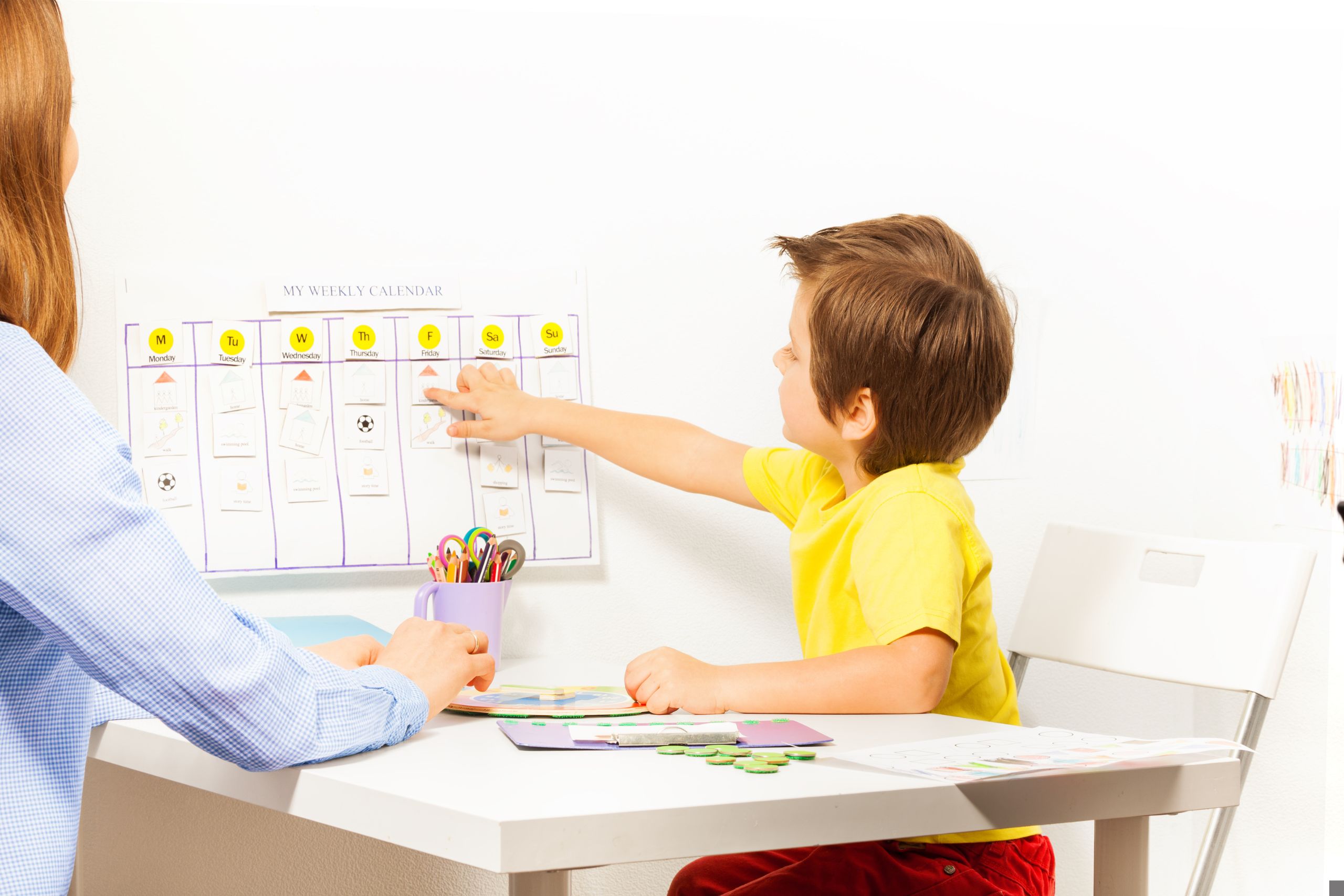Blog
Behavior Consulting Empowers Parents & Improves Family Routines
Parenting comes with its share of beautiful moments and challenging days. Whether you’re navigating bedtime battles, mealtime struggles, or simply trying to establish consistent routines that work for your family, you’re not alone. At FOCUS Therapy in Fort Myers, we understand that every family’s journey is unique, and sometimes a little professional guidance can make all the difference.
What Is Behavior Consulting?
Behavior consulting is a collaborative approach that helps families understand the “why” behind their child’s behaviors and develop practical strategies to create positive change. Our Fort Myers BCBA (Board Certified Behavior Analyst) professionals work closely with parents to identify patterns, understand triggers, and implement evidence-based solutions that fit your family’s specific needs.
The beauty of behavior consulting lies in its focus on empowerment. Rather than simply addressing problematic behaviors, we help parents develop the skills and confidence to support their child’s growth while creating a more harmonious home environment.
How Behavior Consulting Works
When you work with our Fort Myers behavior therapy team, the process begins with understanding your family’s unique situation. Our BCBAs take time to observe, listen, and assess what’s happening in your daily routines. This might involve:
Initial Assessment: We’ll discuss your concerns, observe your child’s behaviors, and identify specific areas where you’d like to see improvement.
Strategy Development: Based on our assessment, we’ll create a personalized plan that includes practical techniques you can implement at home.
Parent Coaching: This is where the magic happens. We’ll teach you evidence-based strategies, help you practice new approaches, and provide ongoing support as you implement changes.
Ongoing Support: Behavior change takes time, and we’re here to celebrate successes, troubleshoot challenges, and adjust strategies as needed.
The Power of Parent Coaching

One of the most valuable aspects of behavior consulting is the parent coaching component. Many families discover that small changes in their approach can lead to significant improvements in their child’s behavior and overall family dynamics.
Through parent coaching, you’ll learn to recognize the early signs of behavioral challenges, understand what might be triggering certain responses, and develop a toolkit of positive strategies. This might include techniques for setting clear expectations, creating effective reward systems, or establishing routines that set everyone up for success.
Real-World Benefits for Family Routines
Behavior consulting can transform everyday situations that may currently feel overwhelming. Here are some common areas where families see positive changes:
- Morning Routines: Instead of starting each day with stress and rushing, families learn to create structured, predictable mornings that help children feel secure and prepared.
- Mealtime Success: Whether dealing with picky eating, mealtime meltdowns, or difficulty staying seated, behavior consulting helps families develop strategies that make mealtimes more pleasant and nutritious.
- Bedtime Peace: Sleep struggles affect the whole family. Our BCBAs help parents create calming bedtime routines and address behaviors that interfere with healthy sleep patterns.
- Sibling Harmony: When siblings struggle to get along, behavior consulting can help parents foster cooperation, teach conflict resolution skills, and create a more peaceful home environment.
- Homework and Daily Responsibilities: Learning to complete tasks independently is a crucial life skill. We help families establish systems that encourage responsibility and reduce daily battles.
A Collaborative Approach
- Categorized: ABA Therapy, Behavior Consulting, Behavior Therapy
- Tagged: ABA therapy, behavior consulting, behavior interventions Fort Myers, behavior therapy, Fort Myers ABA, Fort Myers ABA Therapy, Fort Myers BCBA, Fort Myers behavior consulting, Fort Myers parent coaching, parenting help Fort Myers
Best Fort Myers Playgrounds and Parks for Sensory-Friendly Play
As Fort Myers occupational therapists who work with many families, we know how challenging it can be to find the perfect playground where your child can thrive. Whether your little one is sensory-seeking, sensory-avoiding, or somewhere in between, finding spaces that support their unique needs while still being fun and engaging can feel like searching for a needle in a haystack.
The good news is that Fort Myers is home to some great parks and playgrounds that offer fantastic opportunities for sensory play! Here, we detail some of our favorites.
Understanding Sensory-Friendly Play
Before we dive into our Fort Myers parks adventure, let’s talk about what makes a playground truly sensory-friendly. As occupational therapists, we look for spaces that provide:
- Varied textures and surfaces for tactile exploration.
- Different movement opportunities like swinging, spinning, and climbing.
- Quiet spaces for children who need sensory breaks.
- Natural elements that provide calming sensory input.
- Accessible equipment that accommodates different abilities.
Top Sensory-Friendly Fort Myers Parks
1. Lakes Regional Park – The Sensory Superstar
Lakes Regional Park in Fort Myers offers hiking, biking, kayaking, rock climbing, birdwatching & picnicking facilities along with a miniature railroad, making it an absolute treasure for sensory play. This expansive park is our top recommendation for families seeking diverse sensory experiences.
What makes it special for sensory play:
- Multiple playground structures with different textures and challenges.
- Train rides that provide wonderful vestibular (movement) input.
- Walking trails with varied surfaces – perfect for proprioceptive input.
- Water features and natural elements for calming sensory experiences.
- Plenty of shaded areas for sensory breaks.
Pro tip from our Fort Myers occupational therapists: The miniature train is fantastic for children who crave movement but might feel overwhelmed by playground equipment. The gentle rocking motion provides organizing sensory input.
2. Centennial Park – Downtown’s Hidden Gem
Located along the Caloosahatchee River, this eight-acre park offers waterfront picnic areas and is a great setting for community events. The recently added All Children’s Playground within Centennial Park has become a favorite among our FOCUS families.
Sensory highlights:
- River views and water sounds for auditory calming.
- Sand and grass areas for tactile exploration.
- Swings and climbing structures for proprioceptive input.
- Open spaces perfect for children who need room to move.
- Peaceful setting ideal for sensory-sensitive children.
3. Six Mile Cypress Slough Preserve – Nature’s Sensory Playground

While not a traditional playground, this Fort Myers nature preserve offers incredible sensory experiences that we often recommend. (Bonus: It’s just a four-minute drive from the FOCUS Therapy clinic!) The elevated boardwalk provides a unique sensory adventure through Southwest Florida’s natural habitat.
Why it’s perfect for sensory play:
- Wooden boardwalk provides different tactile feedback under feet.
- Natural sounds of birds and wildlife for auditory processing.
- Visual tracking opportunities as wildlife moves through the preserve.
- Calming environment for children who are easily overstimulated.
- Educational component that engages multiple senses.
4. Buckingham Community Park – The Neighborhood Favorite
This community park offers a more intimate setting that many families find less overwhelming than larger Fort Myers playgrounds. It’s particularly wonderful for children who are just beginning to explore sensory play.
Sensory benefits:
- Smaller playground equipment perfect for building confidence.
- Grassy areas for barefoot sensory exploration.
- Basketball courts for gross motor sensory play.
- Picnic areas for sensory snack breaks.
- Less crowded environment for sensory-sensitive children.
Making the Most of Your Fort Myers Playground Adventures
Some tips from our occupational therapists for maximizing the experience for your child:
Before You Go
- Pack a sensory toolkit: Include fidget toys, noise-canceling headphones, and favorite comfort items.
- Choose optimal times: Early morning or late afternoon often provide the best sensory environment with fewer crowds and more comfortable temperatures.
- Review the plan: Show your child pictures of the playground online to help them prepare for new sensory experiences.
During Your Visit
- Follow your child’s lead: If they’re drawn to swinging, let them swing! Their body is telling them what sensory input they need.
- Encourage exploration: Gently introduce new textures and equipment, but don’t force it.
- Take sensory breaks: Use shaded areas or quiet spots when your child needs to reset.
- Celebrate small wins: Every new sensory experience is progress worth celebrating!
After Your Visit
- Process the experience: Talk about what your child enjoyed and what felt challenging.
- Plan return visits: Repeated exposure to sensory experiences helps build tolerance and enjoyment.
- Share successes: Let your occupational therapist know what worked well so we can build on those experiences in therapy.
At FOCUS Therapy, we’re here to support your family’s journey toward successful sensory experiences. Our pediatric occupational therapy team can help develop strategies specific to your child’s needs and work with you to make playground time enjoyable for everyone.
Beyond the Playground
Remember, sensory play doesn’t have to end when you leave the park. The sensory experiences your child enjoys at the playground can be incorporated into daily routines at home. Whether it’s creating a sensory bin filled with different textures, setting up a backyard obstacle course, or simply encouraging barefoot play in the grass, there are countless ways to support your child’s sensory development.
Remember, every child’s sensory needs are unique, and what works for one child may not work for another – and that’s perfectly okay!
We encourage families to explore these spaces with patience, creativity, and most importantly, joy. Sensory play should be fun for both you and your child. Trust your instincts, follow your child’s lead, and don’t hesitate to reach out for professional support when needed.
Your child’s sensory journey is unique and beautiful. These Fort Myers playgrounds are just the beginning of many wonderful sensory adventures to come!
FOCUS offers pediatric occupational therapy in Fort Myers and throughout Southwest Florida. Call (239) 313.5049 or Contact Us online.
Additional Resources:
More Blog Entries:
Understanding ABA Therapy: Separating Fact from Fiction
As parents navigate the complex world of pediatric therapy options, Applied Behavior Analysis (ABA) therapy often emerges as both a beacon of hope and a source of confusion. Misinformation circulates widely, making it challenging for families to distinguish between evidence-based facts and persistent myths. At FOCUS Therapy, Fort Myers’ leading multidisciplinary pediatric therapy clinic, we believe that informed parents make the best decisions for their children’s developmental journey.
What is ABA Therapy?
Applied Behavior Analysis is a scientifically-backed therapeutic approach that focuses on understanding and improving socially significant behaviors. Far from the outdated stereotypes that persist online, modern ABA therapy has evolved into a comprehensive, individualized treatment that emphasizes positive reinforcement, skill-building, and meaningful progress in real-world settings.
For families seeking Fort Myers ABA therapy, it’s essential to understand that today’s ABA practitioners prioritize the child’s autonomy, interests, and overall well-being while addressing specific developmental goals through evidence-based interventions.
Common Myths About ABA Therapy
Myth 1: ABA Therapy is Rigid and Robotic
The Reality: Contemporary ABA therapy is highly flexible and child-centered. Modern Fort Myers ABA therapists design programs that adapt to each child’s unique learning style, preferences, and developmental needs. Sessions incorporate play, creativity, and natural learning opportunities rather than rigid drills or repetitive tasks.
Myth 2: ABA Suppresses Natural Behaviors and Personality
The Reality: Ethical ABA therapy never aims to suppress a child’s authentic self or natural behaviors. Instead, it focuses on building functional skills that enhance communication, social interaction, and independence while respecting the child’s individual personality and neurodivergent traits.
Myth 3: ABA Therapy Uses Punishment and Negative Reinforcement
The Reality: Modern ABA therapy emphasizes positive reinforcement and evidence-based strategies that celebrate progress and build confidence. At reputable Southwest Florida ABA therapy clinics, practitioners focus on creating positive learning environments where children feel safe, supported, and motivated to learn.
Myth 4: ABA Therapy is Only for Autism
The Reality: While ABA therapy is widely recognized for supporting individuals with autism spectrum disorders, its principles benefit children with various developmental challenges, including ADHD, learning disabilities, and behavioral concerns. The methodology can be adapted to address diverse needs and goals.
Myth 5: ABA Therapy Doesn’t Consider the Whole Child
The Reality: Quality ABA programs take a holistic approach, considering the child’s emotional, social, cognitive, and physical development. This comprehensive perspective ensures that interventions support overall growth and well-being.
FOCUS Therapy’s Collaborative, Evidence-Based Approach
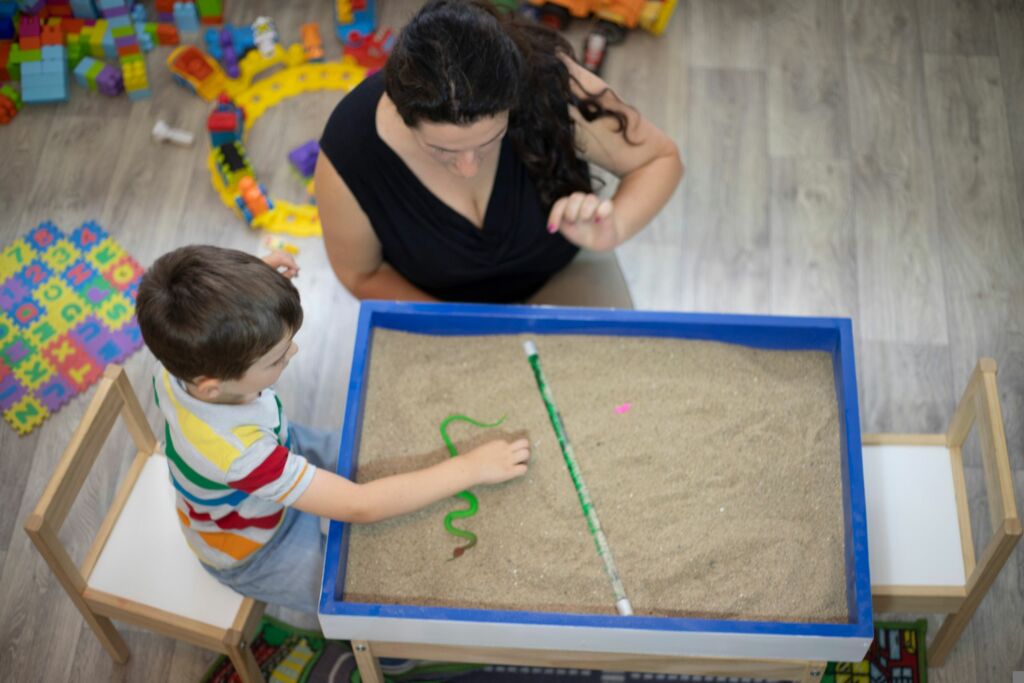
At FOCUS Therapy, we practice ABA therapy that adheres to current best practices and research. Our approach distinguishes us as a premier Fort Myers ABA therapy provider through several key principles:
Multidisciplinary Collaboration
Our ABA therapists work hand-in-hand with Speech-Language Pathologists (SLPs) and Occupational Therapists (OTs) to create comprehensive treatment plans. This collaborative model ensures that each child’s communication, sensory, motor, and behavioral needs are addressed simultaneously, leading to more effective outcomes and faster progress.
The integration of disciplines means that a child working on communication goals with an SLP can simultaneously practice those skills during ABA sessions, while OT strategies for sensory regulation are woven throughout all therapeutic activities. This seamless collaboration maximizes the impact of each therapy session.
Patient-Led Programming
Unlike traditional models where therapists dictate all activities, our patient-led approach honors the child’s interests, motivations, and natural learning style. ABA therapists at FOCUS carefully observe each child to identify their preferred activities, communication methods, and learning patterns, then design interventions that build upon these strengths.
This child-centered methodology ensures that learning feels natural and enjoyable rather than forced or artificial. Children are more engaged when therapy incorporates their fascinations, whether it’s dinosaurs, art, music, or building blocks.
Evidence-Based Interventions
Every strategy used by our Fort Myers ABA therapists is grounded in peer-reviewed research and proven methodologies. We continuously update our practices based on the latest findings in developmental psychology, neuroscience, and behavioral analysis to ensure families receive the most effective interventions available.
Our commitment to evidence-based practice means that we regularly measure progress, adjust strategies based on data, and maintain transparency with families about what’s working and what might need modification.
Play-Priority Learning
Play is the natural language of childhood, and our ABA therapy programs harness this powerful learning medium. Rather than sitting at tables for structured drills, children engage in meaningful play activities that naturally incorporate therapeutic goals.
Whether it’s building social skills through cooperative games, developing communication through imaginative play, or practicing fine motor skills through art projects, our approach makes learning feel like fun rather than work.
Family-Centered Care
Parents are essential partners in their child’s therapeutic journey. Our Southwest Florida ABA therapy clinic provides comprehensive parent training, ensuring that families feel confident implementing strategies at home and supporting their child’s progress between sessions.
Regular family meetings, home visits, and parent education sessions help create consistency between clinic and home environments. We believe that when families are equipped with knowledge and strategies, children make faster, more sustainable progress.
The FOCUS Difference in Fort Myers ABA Therapy
- Categorized: ABA Therapy
- Tagged: ABA therapy, Fort Myers ABA Therapy
FOCUS Therapy Summer Spirit Week!
Our upcoming Summer Spirit Week at FOCUS Therapy is jam-packed with super summer fun in every session! ABA, Speech, OT – all of our departments are joining in, the full week of July 28th to August 1st. We hope you will too!
FOCUS offers pediatric speech therapy, occupational therapy, ABA therapy and ADOS testing in Fort Myers and throughout Southwest Florida. Call (239) 313.5049 or Contact Us online.
- Categorized: FOCUS News
- Tagged: Focus Therapy, Fort Myers ABA Therapy, Fort Myers occupational therapy, Fort Myers speech therapy, speech therapists
Top Signs Your Child May Benefit From an AAC Evaluation
At FOCUS Therapy in Fort Myers, we believe every child deserves a way to communicate—whether through words, gestures, pictures, or technology. For some children, developing spoken language is a longer journey. That’s where AAC, or Augmentative and Alternative Communication, can be life-changing. An AAC evaluation can help your child’s speech-language pathologists (SLPs) determine whether this is an appropriate intervention to help bolster your child’s speech and language development.
As pediatric speech therapists, we often hear questions like:
- “What if my child isn’t talking yet?”
- “Will using AAC prevent them from ever speaking?”
- “Is my child too young—or too old—for AAC?”
These are valid concerns, and we’re here to provide reassurance, support, and clarity.
What Is AAC?
AAC stands for Augmentative and Alternative Communication. It’s a broad term that includes any method of communication that supplements or replaces spoken language. AAC gives children a voice when speech is limited or delayed.
There are many types of AAC, including:
- Low-tech AAC: Picture boards, choice cards, communication books, gestures, and sign language
- Mid-tech AAC: Simple voice-output devices or switches
- High-tech AAC: Speech-generating devices and dynamic communication apps on tablets like iPads
AAC is not a one-size-fits-all solution. It’s highly personalized and designed to meet a child where they are developmentally, cognitively, and physically.
Who Uses AAC?
Many children who use AAC have complex communication needs related to one or more developmental diagnoses. Some of the most common include:
- Autism Spectrum Disorder (ASD)
- Cerebral Palsy
- Down Syndrome
- Childhood Apraxia of Speech
- Global Developmental Delay
- Traumatic Brain Injury
- Rare genetic or neurological conditions
However, a child doesn’t need a specific diagnosis to benefit from AAC. If verbal language is limited, inconsistent, or causing frustration, AAC might be the key to unlocking communication.
Signs Your Child Might Benefit From a Fort Myers AAC Evaluation

If you’re wondering whether your child should undergo an AAC evaluation, here are some signs our Fort Myers speech therapists look for:
- Your child is over age 2 and not yet using words functionally
- Your child uses less than 20 words consistently by age 3
- Your child communicates mostly by pulling, pointing, or crying
- Your child has trouble imitating sounds or words
- Your child shows frustration during communication or has frequent meltdowns
- Your child understands more than they can express
- Your child’s speech is difficult to understand, even by familiar listeners
- Your child has had limited progress in traditional speech therapy alone
AAC can serve as a bridge—or even a permanent solution—to help your child express their thoughts, needs, and feelings.
Myth: AAC Will Stop My Child From Talking
This is one of the biggest misconceptions we hear. According to the American Speech-Language-Hearing Association (ASHA), introducing AAC does not hinder speech development—in fact, it can support and enhance it.
Research shows that AAC can:
- Increase a child’s desire to communicate
- Provide consistent access to language
- Reduce frustration and challenging behaviors
- Improve verbal speech when it does emerge
A 2019 evidence-based review by ASHA confirms that AAC use is associated with increased expressive language, including spoken words, across children with various developmental disabilities.
In other words: AAC doesn’t replace the hope for speech—it supports the path to it.
What Does a Fort Myers AAC Evaluation Look Like at FOCUS Therapy?

When you bring your child to FOCUS Therapy in Fort Myers for an AAC evaluation, you can expect a comprehensive and compassionate process, tailored to your child’s abilities and needs.
Here’s how it works:
1. Gathering the Full Picture
We start by reviewing your child’s developmental history, speech/language milestones, diagnoses, and communication attempts. We collaborate with other members of your child’s therapy team (including OTs, ABA therapists, and teachers) for a full view of strengths and challenges.
2. Assessing Communication Skills
Using formal and informal assessments, we look at receptive language, expressive abilities, motor planning, attention, joint engagement, and symbolic play.
3. Trialing AAC Tools
We may introduce low-tech communication boards or high-tech apps (like LAMP Words for Life, TouchChat, or Proloquo) to see how your child responds. We observe what captures their interest and what allows them to make choices, label items, or request favorite activities.
4. Selecting the Right AAC Approach
Our SLPs recommend a system based on what works now—with the understanding that AAC is flexible and can evolve as your child grows. Sometimes, starting with a simple picture exchange is the right first step. Other times, a high-tech device opens the door to more complex communication.
AAC Doesn’t Have to Be Forever—or High-Tech
Some children use AAC temporarily until verbal language develops. Others use it alongside speech for years. And for many, AAC is a lifelong support that empowers them to thrive.
Also, AAC doesn’t always mean an iPad or expensive device. Many of our families start with picture cards, first-then boards, or choice charts at home. The key is making language visible and accessible—in whatever form that takes.
Empowering Families, One Voice at a Time
At FOCUS Therapy, we know that every child has something to say—and every parent deserves the joy of hearing it. AAC can open up that world of connection, whether it’s with a picture, a button press, or a speech-generating device.
If you’re wondering whether your child may benefit from AAC, trust your instincts—and let’s talk. Our Fort Myers speech therapists are here to guide you through the evaluation process with care, expertise, and the belief that communication is always possible.
Contact FOCUS Therapy in Fort Myers today to schedule a speech-language evaluation and learn more about AAC options for your child. Let’s find their voice—together.
FOCUS offers Fort Myers speech therapy, as well as pediatric ABA therapy, occupational therapy, and ADOS testing. Call (239) 313.5049 or Contact Us online.
Additional Resources:
Augmentative and Alternative Communication (AAC), ASHA Evidence Maps, ASHA
More Blog Entries:
How Fort Myers ABA Therapist Can Support Potty Training & Self-Care Skills
Potty training and developing self-care skills represent significant milestones in every child’s journey toward independence. For many families, these transitions happen naturally with patience and consistency. However, some children—whether they have autism, developmental delays, or are simply struggling with these particular skills—may benefit from the structured, evidence-based approach that an ABA therapist can provide.
At FOCUS Therapy, our Fort Myers ABA therapists know that each child’s path to independence is unique. We’re here to support families through these important developmental stages, offering both in-clinic interventions and comprehensive home-based strategies that make success achievable for every child.

The ABA Approach to Self-Care Skills
ABA — short for Applied Behavior Analysis — breaks down complex behaviors into smaller, manageable steps that children can master progressively. When it comes to potty training and self-care skills, this methodical approach proves invaluable because these activities involve multiple steps, sensory experiences, and behavioral changes that can feel overwhelming to some children.
ABA therapists don’t just focus on the end goal—they examine every component of the process. For potty training, this might include recognizing bodily signals, communicating needs, navigating to the bathroom, managing clothing, completing the toileting process, and following hygiene routines. Each step becomes an opportunity for learning, practice, and celebration.
In-Clinic ABA Strategies for Potty Training Success
Environmental Modifications and Setup
An ABA therapist at FOCUS will begin by creating an optimal learning environment. In the clinic, this involves establishing a bathroom routine that minimizes distractions while maximizing comfort and success. We might use visual schedules posted at child-height, special step stools that provide security, or preferred items that make the bathroom feel less intimidating.
The physical environment is carefully considered—from lighting and noise levels to the availability of supplies. Some children respond well to having their own designated potty seat, while others prefer the regular toilet with modifications. Our therapists assess each child’s sensory preferences and anxieties to create the most supportive setting possible.
Task Analysis and Chaining
One of ABA’s greatest strengths lies in breaking complex behaviors into teachable components. For potty training, an ABA therapist will conduct detailed task analyses that might include 15-20 individual steps, from recognizing the urge to wash hands afterward.
Forward chaining teaches steps in sequence from the beginning, while backward chaining starts with the final step and works backward. For instance, a child might first learn to flush and wash hands (the rewarding end of the sequence) before mastering earlier steps like pulling down pants or sitting on the toilet.
Prompt Hierarchy and Fading
ABA therapists use systematic prompting to guide children through each step while gradually reducing support. This might begin with physical prompts (gently guiding a child’s hands to unfasten clothing), progress to gestural prompts (pointing to the next step), then to verbal prompts (“What do we do next?”), and finally to independence.
The key is fading prompts at just the right pace—quickly enough to promote independence, but slowly enough to maintain success and confidence. Our therapists continuously assess each child’s progress and adjust their prompting strategies accordingly.
Reinforcement Systems
Motivation drives learning, and our Fort Myers ABA therapists are experts at identifying what motivates each individual child. For some, social praise and celebration are incredibly powerful. Others might respond to tangible rewards, preferred activities, or token systems where successful potty trips earn points toward bigger rewards.
The reinforcement schedule is carefully planned—initially providing frequent, immediate rewards for any approximation of the desired behavior, then gradually shifting to more natural, intermittent reinforcement that mirrors real-world expectations.
Comprehensive Self-Care Skill Development
Expanding Beyond Potty Training
While potty training often receives the most attention, ABA supports the full spectrum of self-care skills that contribute to a child’s independence and confidence. Our therapists work on hand washing, teeth brushing, hair care, dressing, and eating skills using the same evidence-based principles.
Each skill area receives the same systematic attention—task analysis, environmental modifications, prompting strategies, and individualized reinforcement. For example, tooth brushing might be broken down into getting the toothbrush, putting on toothpaste, brushing all tooth surfaces, spitting, and rinsing.
Addressing Sensory Considerations
Many children who struggle with self-care skills have underlying sensory sensitivities that make these activities challenging. An ABA therapist will collaborate closely with occupational therapists to address these needs. This might involve gradually introducing new textures, using preferred scents or flavors, or modifying tools and materials to increase comfort and success.

Home-Based Implementation Plans
Detailed Parent Training Protocols
The most effective ABA interventions extend far beyond the clinic walls. Our therapists develop comprehensive implementation plans that allow parents to continue the structured approach at home. These plans include step-by-step instructions, troubleshooting guides, and data collection systems that help families track progress.
Parent training sessions ensure that caregivers understand not just what to do, but why each strategy works and how to modify approaches based on their child’s responses. We provide written protocols, visual supports, and ongoing consultation to support successful home implementation.
Individualized Visual Supports
Visual schedules, social stories, and picture cards become invaluable tools that travel between clinic and home. Our therapists create customized visual supports that reflect each family’s specific routines, bathroom setup, and cultural preferences. These tools provide consistent cues and expectations across all environments.
Data Collection and Progress Monitoring
Families receive simple but effective data collection systems that help track their child’s progress at home. This might include charts for successful potty trips, checklists for self-care routines, or apps that make data collection convenient and motivating for both parents and children.
Regular data review allows for timely adjustments to strategies and celebrates incremental progress that might otherwise go unnoticed.
Generalization Across Environments
Community-Based Training
True independence means using skills in all relevant settings. Our ABA therapists help families plan for generalization to grandparents’ homes, schools, restaurants, and other community locations. This involves identifying potential challenges in different environments and pre-teaching strategies for success.
School Collaboration
For children in educational settings, our therapists work closely with teachers and school staff to ensure consistency across environments. This collaboration includes sharing successful strategies, providing training for school personnel, and developing individualized plans that work within the school’s structure and resources.
Specialized ABA Therapist Consultation Services
Supporting All Families
At FOCUS Therapy, we recognize that potty training and self-care challenges aren’t limited to children with diagnosed conditions. Our ABA therapists offer behavior consulting services for any family struggling with these important skills, regardless of whether their child is currently receiving other therapeutic services.
This consulting approach allows families to access ABA expertise on an as-needed basis, whether they need help getting started with potty training, addressing regression, or developing strategies for particularly challenging behaviors.
Flexible Service Delivery
Our consultation services can be delivered through various formats—in-person sessions, virtual consultations, phone support, or intensive training sessions. This flexibility ensures that families can access support in whatever way works best for their schedules and comfort levels.
Common Challenges and Solutions
Addressing Resistance and Regression
It’s normal for children to show resistance or experience setbacks during potty training and self-care skill development. An ABA therapist will be prepared for these challenges and have systematic approaches for working through them.
Resistance might be addressed by adjusting reinforcement systems, modifying environmental factors, or breaking skills into even smaller steps. Regression often responds to returning to more intensive support temporarily while investigating potential causes like illness, stress, or changes in routine.
Managing Multiple Environments
One of the biggest challenges families face is maintaining consistency across different settings. Our therapists help families develop portable strategies, train multiple caregivers, and create communication systems that ensure everyone involved understands and implements the same approaches.
The Science Behind ABA Effectiveness
Evidence-Based Practice
The strategies used in ABA for potty training and self-care skills aren’t based on intuition or tradition—they’re grounded in decades of research on human learning and behavior change. This evidence base provides confidence that the time and effort invested in these approaches will yield meaningful results.
Individualization Within Structure
While ABA provides a systematic framework, every intervention is highly individualized. Our therapists conduct thorough assessments, consider each child’s unique strengths and challenges, and continuously adjust strategies based on ongoing data collection and observation.
Long-Term Benefits
Building Foundation Skills
Success with potty training and basic self-care skills provides more than just practical benefits. These achievements build confidence, promote independence, and establish patterns of learning that serve children well in other areas of development.
Family Quality of Life
When children master these essential skills, the entire family experiences reduced stress, increased flexibility, and greater opportunities for community participation. Parents report feeling more confident in their parenting abilities and more optimistic about their child’s future independence.

Moving Forward with Confidence
Potty training and self-care skill development represent significant transitions for both children and families. While these processes can feel daunting, the systematic, compassionate approach provided by ABA therapy offers a clear path forward.
At FOCUS Therapy, we’re committed to supporting every family through these important milestones, whether through intensive in-clinic services or targeted consultation support. Our goal is not just to help children master specific skills, but to build confidence, promote independence, and strengthen family relationships along the way.
If your child is struggling with potty training or other self-care skills, remember that you don’t have to navigate these challenges alone. Our experienced ABA therapists are here to provide the expertise, support, and encouragement your family needs to succeed.
FOCUS offers Fort Myers ABA therapy, behavior consulting/parent coaching, as well as speech therapy, occupational therapy, and ADOS testing. Call (239) 313.5049 or Contact Us online.
Additional Resources:
Toilet Training Children With Autism and Developmental Delays: An Effective Program for School Settings, Winter 2012, Behavior Analysis in Practice
More Blog Entries:
Fort Myers OT Insights: Helping Children With Autism Manage Sensory Overload
At FOCUS Therapy in Fort Myers, we work with incredible children every day—kids who are learning, growing, and thriving in their own unique ways. For many of the children we serve with autism spectrum disorder (ASD), one of the most persistent challenges they face is sensory overload.
As pediatric occupational therapists (OTs), we understand that sensory overload isn’t just about “being sensitive” or “overreacting.” It’s a neurological response—a real, often overwhelming experience that can impact a child’s ability to function, communicate, and feel safe in their environment. The good news? With the right supports, strategies, and self-regulation tools, children can learn to manage these responses—and even advocate for their own needs.
What Is Sensory Overload?
As a Fort Myers OT can explain, sensory overload happens when the brain has trouble processing and organizing all the input it’s receiving from the senses. These inputs—like bright lights, loud noises, scratchy clothes, strong smells, or even crowded spaces—can become too much, too fast.
Instead of filtering and prioritizing sensory information the way a neurotypical brain might, a child with sensory processing difficulties may experience a flood of input all at once. This can lead to:
- Meltdowns or shutdowns
- Difficulty focusing or following directions
- Anxiety or panic
- Physical discomfort or agitation
- Avoidance of certain environments or tasks
And it can happen anywhere—a noisy classroom, a grocery store aisle, a birthday party, or even during family dinner.
When and Where Does Sensory Overload Manifest?
Sensory overload can manifest unexpectedly or predictably, depending on your child’s unique triggers. Some common sensory triggers include:
- Auditory: loud music, vacuum cleaners, crowded places
- Visual: flickering lights, busy rooms, fast movement
- Tactile: tags in clothing, messy textures, temperature changes
- Olfactory: strong perfumes, cleaning products, food smells
- Proprioceptive/Vestibular: imbalance, lack of movement, unexpected touch
It’s important to remember that no two children are exactly alike. What overwhelms one child might be soothing to another. That’s why the role of a Fort Myers OT is to identify each child’s sensory profile and build individualized strategies that help them navigate their world more comfortably.
How a Fort Myers OT Can Help Children With Autism Manage Sensory Overload
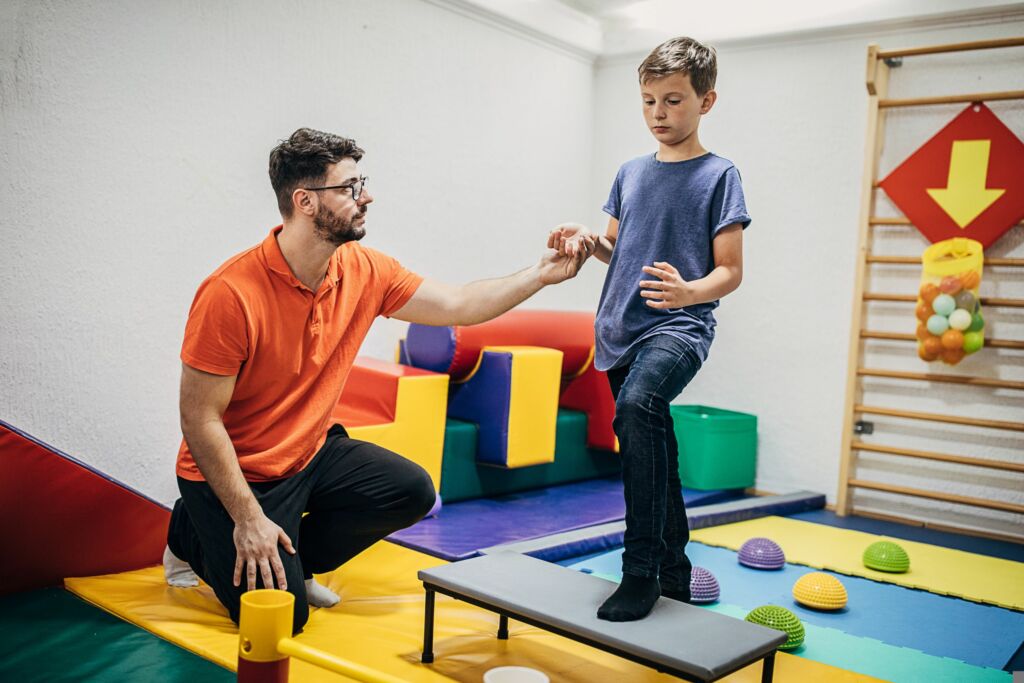
At FOCUS Therapy, our occupational therapists use evidence-based sensory integration practices to help children understand and respond to their sensory needs. We begin with a thorough sensory assessment, often using tools like the Sensory Profile or Sensory Processing Measure, combined with parent interviews and direct observation.
From there, we create a personalized therapy plan that might include:
- Sensory diets: Customized routines of sensory activities that help children stay regulated throughout the day (e.g., swinging, deep pressure input, fidget tools)
- Environmental modifications: Strategies to reduce sensory triggers in the home, school, or community (e.g., noise-canceling headphones, dim lighting, sensory-friendly clothing)
- Self-regulation training: Teaching children how to identify when they are becoming overwhelmed and use calming techniques, such as deep breathing, visual supports, or movement breaks
- Advocacy and communication tools: Helping children express their needs using visual schedules, AAC devices, or social scripts
According to the American Occupational Therapy Association (AOTA), occupational therapy interventions grounded in sensory integration can lead to measurable improvements in self-regulation, social participation, and daily routines for children with autism.
Tips for Parents: Anticipating and Managing Sensory Overload
As our Fort Myers OT team members can tell you, one of our most important goals is empowering parents. You are your child’s first and best advocate, and your presence and preparation can make all the difference. Here are some tips we often share with families at FOCUS Therapy:
✅ Know Your Child’s Triggers
Keep a journal or log of when meltdowns or shutdowns occur. Are they tied to transitions, noise, textures, crowds, or fatigue? Patterns will help you anticipate challenges.
🎒 Create a “Sensory Go-Bag”
Pack a small kit with your child’s preferred tools: noise-reducing headphones, chewy tubes, calming scents, sunglasses, a weighted lap pad, or fidgets.
🕓 Practice Proactive Regulation
Don’t wait for overload—build movement breaks, calming activities, or quiet time into your child’s routine. Use timers, schedules, and visual cues to help prepare them for transitions.
🧠 Teach Emotional Literacy
Even young children can learn to identify how they’re feeling. Use visuals like color-coded zones (e.g., green = calm, red = overwhelmed) to help them recognize and name their state.
💬 Model and Encourage Advocacy
Teach your child phrases or visuals to express sensory needs, such as “Too loud,” “Need a break,” or “No touch.” The more we support their voice, the less frustrated they feel.
🧩 Work With Your Therapy Team
Don’t hesitate to ask your child’s occupational therapist to help build routines and supports for the home or classroom. We can provide sensory checklists, communication supports, or collaborate with teachers and caregivers.
We’re Here to Help You and Your Child Thrive
Sensory overload is real—but with the right support, your child can learn to thrive in their body and their world. At FOCUS Therapy in Fort Myers, our occupational therapists are here to guide, encourage, and celebrate each child’s progress—every step of the way.
If you suspect your child may be experiencing sensory challenges or would like support in building a personalized sensory plan, we’d love to hear from you. Let’s work together to help your child build the confidence, regulation, and resilience they need to succeed.
Contact FOCUS Therapy today to learn more about our pediatric occupational therapy services for children with autism in Fort Myers, Florida. Your journey—and your child’s comfort—matters to us.
FOCUS offers Fort Myers occupational therapy, as well as pediatric ABA therapy, speech therapy, and ADOS testing. Call (239) 313.5049 or Contact Us online.
Additional Resources:
Sensory Meltdown vs. Tantrum: What’s the Difference? Akron OT Explains, Therapy & Wellness Connection
More Blog Entries:
Why Fort Myers ABA Therapists Identify the ‘Why’ Behind Behaviors
As Fort Myers ABA therapists, we often hear parents ask, “Why does my child do that?” Whether it’s tantrum behaviors, communication challenges, or difficulties with daily routines, understanding the “why” behind behaviors is not just helpful—it’s essential for creating meaningful change. This is where the Functional Behavior Assessment (FBA) becomes one of our most valuable tools in developing effective treatment plans for children with autism and developmental differences.
What Is a Functional Behavior Assessment?
As our FOCUS Therapy Board Certified Behavior Analysts (BCBAs) can explain, the Functional Behavior Assessment (FBA) is a systematic process used to identify the underlying causes or “functions” of challenging behaviors. Rather than simply addressing what the behavior looks like, an FBA helps us understand why the behavior occurs in the first place.
The core principle behind an FBA is that behavior serves a purpose. Children engage in challenging behaviors because, on some level, these behaviors work for them. They might:
- Help them get something they want (attention, a preferred item)
- Help them escape something unpleasant (a difficult task, sensory input)
- Provide sensory stimulation or self-regulation
- Communicate a need when other communication methods aren’t available
By identifying these functions, our Fort Myers ABA therapists can develop interventions that teach more appropriate ways to meet the same needs, leading to lasting behavioral change.
When Is an FBA Used?
At FOCUS Therapy, our BCBAs will conduct FBAs when:
- A child demonstrates persistent challenging behaviors that interfere with learning or daily functioning.
- Previous intervention strategies haven’t been effective.
- We’re developing or revising a behavior intervention plan (BIP).
- A child is starting Applied Behavior Analysis (ABA) therapy.
- There’s a significant change in behavior patterns.
- We need to ensure our therapy approach is tailored to the child’s specific needs.
The FBA Process: How It Works

The FBA process typically involves several components:
1. Information Gathering
We begin by collecting detailed information about the behavior from multiple sources:
- Parent/caregiver interviews: Understanding patterns, triggers, and responses to behaviors across environments.
- Direct observation: Observing the child in natural settings to document what happens before, during, and after behaviors.
- Data collection: Systematically recording instances of the behavior to identify patterns.
2. ABC Analysis
A cornerstone of the FBA is the ABC analysis:
- Antecedent: What happens immediately before the behavior occurs?
- Behavior: What exactly does the behavior look like?
- Consequence: What happens immediately after the behavior?
This analysis helps Fort Myers ABA therapists identify patterns and triggers that may not be immediately obvious. For example, we might discover that a child’s tantrums consistently occur during transitions between activities, suggesting that the behavior serves to delay or avoid transitions.
3. Hypothesis Development
Based on the information gathered, we develop hypotheses about the function(s) of the behavior. Research demonstrates that accurately identifying behavioral functions leads to more effective and efficient interventions.
Common functions include:
- Attention-seeking. The behavior results in social attention
- Escape/avoidance. The behavior helps avoid or end non-preferred activities
- Access to tangibles. The behavior results in access to preferred items or activities
- Sensory stimulation/regulation. The behavior provides sensory input or helps with regulation
4. Hypothesis Testing
To confirm our hypotheses, Fort Myers ABA therapists may conduct structured observations or functional analyses where conditions are carefully arranged to test each potential function.
5. Intervention Planning
Once we understand why the behavior occurs, we develop an individualized Behavior Intervention Plan (BIP) that:
- Teaches replacement behaviors that serve the same function
- Modifies environmental factors that trigger the behavior
- Adjusts how others respond to the behavior
- Builds skills that support appropriate behavior
Why FBAs Are Essential in Evidence-Based Practice for Fort Myers ABA Therapists
FBAs are a cornerstone of evidence-based behavioral therapy for several reasons:
- Categorized: ABA Therapy
- Tagged: ABA therapists, ABA therapists Fort Myers, ABA therapy, ABA therapy Fort Myers, Fort Myers ABA therapists
Building Routines: Fort Myers Parent Coaching Teaches Consistency for Kids Who Need Predictability
For many children, particularly those with developmental differences, autism spectrum disorder, ADHD, or sensory processing challenges, predictability isn’t just preferable—it’s essential. At FOCUS Therapy, our Board Certified Behavior Analysts (BCBAs) work closely with parents receiving our Fort Myers parent coaching services to develop consistent routines that create a sense of security and foster developmental growth.
Why Predictable Routines Matter
Children thrive on knowing what to expect. Research consistently shows that predictable environments help children develop:
- Improved emotional regulation
- Reduced anxiety and behavioral challenges
- Greater independence in daily activities
- Enhanced ability to transition between activities
- Stronger parent-child relationships
Dr. Ronit Molko, a renowned expert in behavioral intervention, notes that “predictability creates a foundation of safety from which children can explore, learn, and develop critical skills.” When children understand what comes next in their day, they’re better equipped to manage their emotions and engage meaningfully with their environment.
The Science Behind Routine and Predictability
Research supports the effectiveness of consistent routines for children’s development. Studies have shown that household routines are associated with better self-regulation skills in young children, particularly those with developmental challenges.
One compelling study published in the Journal of Developmental & Behavioral Pediatrics demonstrated that consistent bedtime routines were linked to improved sleep quality, daytime behavior, and parent-child interactions.
Signs Your Child May Benefit from More Structure
Our Fort Myers parent coaching / child behavior specialists often hear from parents who aren’t sure if their child needs more routine. Consider these indicators:
- Frequent meltdowns during transitions
- Difficulty adapting to changes in schedule
- Asking repetitive questions about what will happen next
- Resistance to participating in family activities
- Sleep difficulties
- Increased anxiety in new situations
If these signs sound familiar, implementing more structured routines could significantly benefit your child and your entire family. Behavior consulting can help.
Creating Effective Routines: The FOCUS Approach
At FOCUS Therapy, our Fort Myers parent coaching is about empowering parents with practical strategies to build routines that work. Here’s our evidence-based framework:
1. Start with Visual Supports
Children who struggle with processing verbal information benefit tremendously from visual schedules. Research from the American Journal of Occupational Therapy shows that visual supports increase independence and reduce challenging behaviors.
Practical Tip: Create a simple visual schedule using pictures or icons that represent daily activities. Review it together each morning and reference it throughout the day.
2. Build Consistency Across Environments
Effective routines maintain consistency across different settings—home, school, therapy sessions, and other environments your child frequents. Our Fort Myers parent coaching specialists work with families to coordinate routines across settings.
Practical Tip: Share your visual schedules and routine strategies with teachers, grandparents, and other caregivers to maintain consistency.
3. Incorporate Sensory Considerations
Many children who need predictability also have sensory processing differences. A 2021 study in the Journal of Autism and Developmental Disorders found that incorporating sensory strategies into daily routines significantly reduced anxiety and improved compliance.
Practical Tip: Build in regular sensory breaks throughout the day, such as jumping, deep pressure activities, or quiet time with headphones.
4. Create Transition Warnings
Transitions often trigger distress in children who need predictability. Our BCBAs teach parents to implement effective transition strategies.
Practical Tip: Use timers, countdowns, or transition songs to signal upcoming changes. For example, “In five minutes, we’ll clean up and go to lunch.”
5. Establish Priority Routines
Research suggests focusing on these key daily routines first:
- Morning routine
- Mealtime routine
- Bedtime routine
- Homework/after-school routine
A structured study in Pediatrics found that consistent mealtime and bedtime routines were associated with better health outcomes, including reduced obesity risk and improved sleep.
6. Build in Flexibility Gradually
While predictability is important, some flexibility is necessary for real-world functioning. Our parent coaching program teaches families how to gradually introduce controlled changes to routines.
Practical Tip: Start with small variations in less problematic routines, preparing your child in advance and praising successful adaptation.

When Routines Aren’t Working: Troubleshooting with Expert Fort Myers Parent Coaching Support
Sometimes, despite best efforts, routines don’t seem to “stick.” Our Fort Myers parent coaching specialists identify common challenges:
- The routine may be too complex
- It may not accommodate your child’s sensory needs
- There might be underlying issues requiring additional support
- Environmental factors may be interfering
Through our comprehensive parent coaching program, FOCUS Therapy’s BCBAs provide ongoing support to refine routines and address challenges as they arise.
Fort Myers Parent Coaching at FOCUS Therapy
At FOCUS Therapy, our Fort Myers parent coaching services offers something unique: child behavior specialists who understand the intersection of behavioral analysis, child development, and family dynamics.
A 2020 study in the Journal of Applied Behavior Analysis demonstrated that parent-implemented interventions guided by BCBAs produced significant improvements in child behavior and reduced parental stress.
Our parent coaching program provides:
- Personalized routine development based on your child’s specific needs.
- Evidence-based strategies drawn from applied behavior analysis.
- Coordination with other therapies your child may receive (speech therapy, occupational therapy, ABA).
- Ongoing support as your child grows and needs evolve.
Taking the First Step
Building effective routines doesn’t happen overnight. It requires consistency, patience, and expert guidance. If you’re struggling with establishing routines that work for your child, FOCUS Therapy’s Fort Myers parent coaching / behavior consulting services can help.
Our BCBAs work alongside parents, providing the tools and strategies needed to create the predictable environment in which children with developmental differences thrive. Remember that even small improvements in routine can lead to significant positive changes in your child’s behavior and overall well-being.
To learn more about our evidence-based parent coaching services in Fort Myers, contact FOCUS Therapy today. Together, we can build routines that support your child’s unique developmental journey and strengthen your entire family.
FOCUS Therapy offers comprehensive pediatric services including ABA therapy, speech therapy, occupational therapy, and parent coaching in Fort Myers. Our team of dedicated professionals works together to support children with developmental differences and their families.
Additional Resources:
How the Activity Schedules Impact the Children with Autism Spectrum Disorder? A Meta-analysis, January 2023, Egitimbilim, Journal of Theoretical Educational Science
More Blog Entries:
Feeding Therapy Strategies for Family Mealtimes With Your Picky Eater
Mealtime should be a nourishing experience—both nutritionally and emotionally—for families. However, for parents of picky eaters, the dinner table can become a battleground of frustration, worry, and stress. At FOCUS Therapy, we understand the unique challenges faced by families navigating feeding difficulties, whether stemming from sensory processing differences, oral motor challenges, or developmental concerns. Feeding therapy can help.
Our multidisciplinary team of occupational therapists, speech-language pathologists, and behavior analysts work together to support children and families through comprehensive, evidence-based approaches to our Fort Myers feeding therapy.
Understanding Feeding Sensitivities
Feeding sensitivities with kids can manifest in various ways:
- Sensory Processing Differences. Heightened sensitivity to textures, temperatures, tastes, or smells. that can make certain foods feel overwhelming or intolerable.
- Oral Motor Challenges. Difficulties with chewing, swallowing, or manipulating food in the mouth.
- Behavioral Components. Anxiety, rigidity, or negative associations with eating situations.
- Medical Factors. Reflux, allergies, or other conditions that can make eating uncomfortable or painful.
Research indicates that approximately 25% of typically developing children and up to 80% of children with developmental differences experience feeding challenges. Understanding the specific nature of your child’s feeding sensitivity is the first step toward effective intervention.
Creating a Supportive Mealtime Environment
1. Establish Consistent Routines
Children who are “picky eaters” often have feeding sensitivities — and they tend to do best with mealtimes when there is some measure of predictability. Consistent mealtime routines are known to reduce anxiety and increase food acceptance in children with feeding difficulties.
Practical strategies:
- Serve meals at approximately the same times each day.
- Follow a predictable pre-meal routine (handwashing, setting the table, etc.).
- Use a visual schedule to illustrate mealtime steps.
- Maintain the same seating arrangements when possible.
2. Design a Sensory-Friendly Space
Environmental factors can significantly impact a “picky eater’s” willingness and ability to engage with food.
Practical strategies:
- Minimize distractions (turn off TV, reduce background noise).
- Consider lighting—some children are sensitive to bright or fluorescent lights.
- Provide seating that supports proper positioning (feet flat, hips and knees at 90-degree angles).
- Offer adaptive utensils or plates if needed (speak with your occupational therapist about recommendations).
- Have a “safe space” nearby if your child needs a sensory break.
3. Model Positive Eating Behaviors
Children learn by watching others. Parental modeling at mealtimes can be a powerful influence on children’s eating behaviors.
Practical strategies:
- Eat together as a family whenever possible.
- Demonstrate enjoyment and positive language around food.
- Avoid making negative comments about foods you dislike.
- Show interest in trying new foods yourself.
- Talk about the sensory properties of foods in neutral terms (“This apple is crunchy” rather than “Do you like it?”).
Evidence-Based Strategies for Mealtime Success
1. The Division of Responsibility Approach
Developed by registered dietitian Ellyn Satter, this approach defines clear roles for parents and children:
- Parents decide: What food is offered, when meals happen, where meals occur.
- Children decide: Whether to eat and how much to eat.
This approach reduces mealtime pressure and has been shown to improve long-term feeding outcomes.
Practical strategies:
- Provide at least one food your child typically accepts at each meal.
- Avoid forcing, bribing, or rewarding eating behaviors.
- Trust your child’s internal hunger and fullness cues.
- Focus on making mealtimes pleasant rather than on the quantity consumed.
2. Systematic Desensitization
For children with strong sensory aversions, gradual exposure to new foods is key. Research indicates that a step-by-step approach helps reduce anxiety and build tolerance.
Practical strategies:
- Use a food hierarchy moving from simply tolerating food nearby to interacting with and eventually tasting it.
- Encourage interaction with food through play (outside of mealtimes).
- Practice the “one-bite rule” with flexibility—ask for a tiny taste but don’t force it.
- Celebrate small victories, like touching or smelling a new food.
3. Visual and Tactile Food Exploration
Many children benefit from non-pressured opportunities to explore foods using multiple senses before eating them. Research has shown that multisensory exposure significantly increased food acceptance in children with feeding difficulties.
Practical strategies:
- Allow food exploration with hands (even if messy).
- Describe foods using specific sensory terms (crunchy, smooth, cold).
- Create food art or play games with foods to increase familiarity.
- Use food chaining—connecting preferred foods to new foods with similar properties.
4. Addressing Oral Motor Challenges
For children with difficulties chewing, swallowing, or managing different textures, specific strategies targeting oral motor skills can be beneficial.
Practical strategies:
- Ensure proper positioning during meals (stable core, feet supported).
- Offer foods that match your child’s oral motor abilities (as guided by your speech-language pathologist).
- Practice oral motor exercises recommended by your therapy team.
- Consider using specialized feeding utensils or cups.
Special Considerations for Children with Autism Spectrum Disorder (ASD)
Children with ASD often face unique challenges around feeding. A comprehensive review by Ledford & Gast found that structured behavioral approaches combined with sensory integration techniques showed the greatest success for these children.
Practical strategies:
- Implement visual supports to increase predictability.
- Consider the sensory environment carefully (lighting, sounds, smells).
- Use high-interest activities or special interests to encourage food interaction.
- Work with a Board Certified Behavior Analyst (BCBA) to develop individualized reinforcement strategies.
- Progress at your child’s pace, recognizing that change may be especially challenging.
When Professional Feeding Therapy Support Is Needed
While many feeding issues can improve with home strategies, some situations warrant professional intervention. Some that might:
- Limited food variety (fewer than 20 different foods).
- Nutritional concerns or weight loss/insufficient gain.
- Mealtime behaviors that are disruptive to family functioning.
- Signs of swallowing difficulty (coughing, choking, gagging).
- Anxiety or distress that impacts quality of life.
At FOCUS Therapy, our interdisciplinary approach allows us to address feeding challenges comprehensively through:
- Occupational Therapy. Addressing sensory processing and motor planning aspects of feeding.
- Speech-Language Pathology. Focusing on oral motor skills, swallowing safety, and communication during meals.
- Specialized Feeding Therapy. Combining techniques from both disciplines for targeted intervention.
- Applied Behavior Analysis (ABA). Implementing structured behavioral approaches to expand food acceptance.
- Family Support. Providing education, emotional support, and practical strategies for implementation at home.
The journey toward positive mealtimes for children with feeding sensitivities isn’t always linear. But with patience, consistency, and evidence-based strategies used in Fort Myers feeding therapy, progress is possible. Remember that small steps are worth celebrating, and that building a healthy relationship with food takes time.
At FOCUS Therapy, we’re committed to partnering with families to create individualized plans that address each child’s unique needs. If you’re concerned about your child’s feeding patterns or mealtime behaviors, our team is here to help.
Schedule a Consultation
If you’re concerned about your child’s eating habits, our multidisciplinary team may be able to help. FOCUS Therapy offers pediatric feeding therapy and swallowing therapy in Fort Myers. Call (239) 313-5049 or Contact Us online.
Additional Resources:
What is Feeding Therapy? Can it Help Your Child Eat Better? Sept. 23, 2024, WebMD
More Blog Entries:





